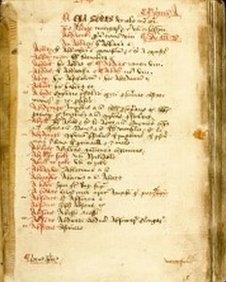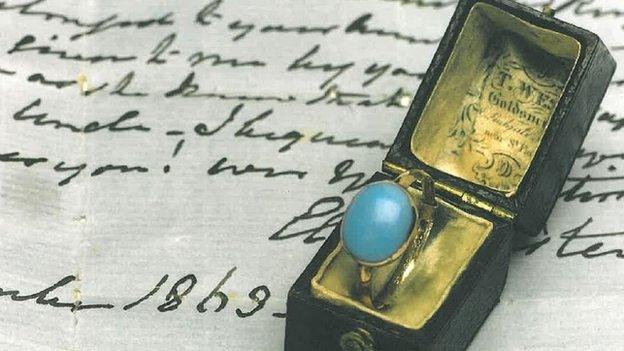Time up on export bar for 500-year-old dictionary
- Published

It is believed the dictionary was written in the north of England.
The deadline on an export bar to stop a 500-year-old dictionary from leaving the UK has passed.
The export bar was put in place last year by Culture Minister Ed Vaizey, after a Middle English-Latin dictionary dating from 1483 was sold to an overseas buyer at auction for £92,500.
If a matching offer has not been made by a UK organisation, the sale of the Catholicon Anglicum will go ahead.
The manuscript is one of the earliest examples of an English dictionary.
'Outstanding significance'
The Department of Culture Media and Sport said that the Catholicon Anglicum was the only complete one in existence, and represented a crucial milestone in the evolution of the English dictionary.
The only other known copy is held at the British Library, but it has lost leaves in several places.
It is believed the dictionary was written in the north of England, specifically Yorkshire, based on the dialect of the English words present.
Speaking at the time he imposed the bar Mr Vaizey said: "The manuscript is of outstanding significance for the history of the English language, which is fundamental to the identity and life of our nation.
"The Catholicon would make a tremendous addition to any one of our great libraries and I hope it remains here in the UK permanently."
'Rare survival'
If a matching offer has not been found then the manuscript's departure from the UK could only be further deferred until June 16 if the minister decides that a third party has made known its "serious intention" to raise the necessary funds.
Mr Vaizey's decision to defer granting an export licence followed a recommendation by the Reviewing Committee on the Export of Works of Art and Objects of Cultural Interest (RCEWA), administered by Arts Council England.
Christopher Wright from the RCEWA said: "This rare survival of a 15th Century English-Latin word list is one of the vital first steps on the road to the English Dictionary as we know it today.
"Its anonymous author, possibly a Yorkshireman on the basis of some dialect words included, provides an invaluable witness to the English language as it existed in the second half of the 15th Century, and can claim an honourable place in the roll of famous lexicographers that stretches through Johnson and Murray into our own age."
The identity of the seller of the dictionary has not been revealed.
Dingo painting
Export bars have been used on a number of occasions in recent years to try and prevent items of interest from leaving the UK.
A famous example of an export bar being used successfully was in February and involved the American singer Kelly Clarkson.
The 31-year-old star bought the former ring of author Jane Austen at auction for £152,450 in 2012. But after Mr Vaizey imposed an export bar the Jane Austen's House Museum in Hampshire found the cash to keep the heirloom in the country.
Similarly in November 2013, two 18th Century paintings featuring a kangaroo and a dingo and painted by George Stubbs were kept in the UK after initially being subject to export bar.
The paintings are of particular interest as they gave the public their first glimpse of such animals, and were created via Mr Stubbs using spoken accounts of what the animals looked like.
A £1.5m donation from shipping magnate Eyal Ofer enabled the National Maritime Museum to buy the paintings.

Pop star Kelly Clarkson bought Jane Austen's ring at auction for £152,450 in 2012.
- Published6 February 2013
- Published6 November 2013
- Published8 February 2013
- Published17 August 2012